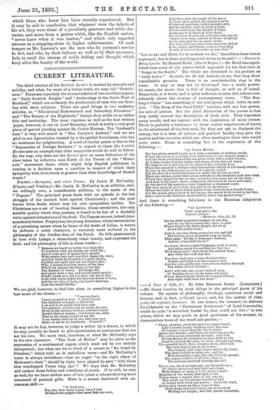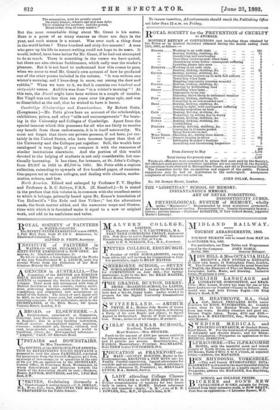"Let us eat and drink, for to-morrow we die," has
seldom been better expressed ; but is there anything much worse to be said ?—Poems Afany Lands. By Rennell Redd. (David Bog,ne.) —Mr. Rodd has repub- lished here some of the poems which appeared for the first time in " Songs in the South." The whole are described in his preface as " early lyrics." As such, we do not hesitate to say that they show considerable promise. There is an unmistakeable ring in the verse. It may or may not be developed into a really power- ful music, the music that is full of thought, as well as of sound. Meanwhile, it is there, and is quite sufficient to raise this volume con- siderably above the average of contemporary verse. " The Sea- king's Grave" has something of the wild power which befits its sub- ject. "The Song of the Dead Child " touches, with not less power, the note of pathos. But the chief distinction of the poems is that they really answer the description of their title. They represent many moods, and are instinct with the inspiration of many scenes. There is probably a hindrance in these varied experiences of travel to the attainment of the first rank, for they are apt to dissipate the energy, but to a man of culture and poetical faculty they give the motive and the occasion which are often wanting to those who would write verse. There is something fine in the expression of the following :—
"AT LANITCIDNE.
'Fade quid potias die
Neptuei facium.'
—HORACE, Odes, iii., 28.
SpEng grew to perfect summer in one day, And we lay there among the vines, to gaze Where Ciree's isle floats purple, far away Above the golden haze; And on our ears there seemed to rise and fall The burden of an old-world song we knew, That sang, ' To-day is Neptune's festival, And we, what shall we do ?'
Go down, brown-armed Campagna maid of mine, And bring again the earthen jar that lies With three years' dust above the mellow wine; And while the swift day dies
You first shall sing a song of waters blue, Paphos and Cnidos in the summer seas,
And one who guides her swan.drawn chariot through The white-shored Cyclades ; And I will take the second turn of song,
Of floating tresses in the foam and surge Where Nereid maids about the sea-god throng;
And night shall have her dirge."
"AT TIBER Mora.
The low plains stretch to the west with a glimmer of rustling weeds, Where the waves of a golden river wind home by the marshy meads ; And the fresh wind born of the sea grows faint with a sickly breath,
As it stays in the fretting rushes and blows on the dews of death.
Wo came to the si'ent city, in the glare of the noontide heat, When the sound of a whieper rang through the length of the lonely street ; No tree in the elefted ruin, no echo of song nor sound, But the dust of a world forgotten lay under the barren ground.
There are shrines under these green hillocks to the beautiful gods that sleep Where they prayed in the stormy s. soon for lives gone out on the deep ; And here in the grave street sculptured, old record of loves and tears, By the dust of the nameless slave, forgotten a thousand years. Not ever again at even shall ship sail in on the breeze,
Where the hulls of their gilded galleys came home from a hundred seas,
For the marsh plants grow in her haven, the marsh birds breed in her bay, And a mile to the shoreless westward the water has passed away."
And there is something felicitous in the Horatian adaptation of the following :—
—2i Year of Life, 4.-c. By John Cameron Grant. (Longmans.) —Mr. Grant touches on most things in the principal poem of his volume. He speaks of philosophy, theology, questions social and literary, and, in fact, quidquid aguid, aud, for the matter of that, quidquid cogitant, homines. In one stanza, for instance, he delivers his judgment on the "Permanent Settlement" of Lord Cornwallis, which he calls "a wretched feudal lie, that could not live ;" in two others, which we may quote as good specimens of his manner, he characterises trees of the wood and garden,— "There, glowing, stood the glorious copper-beech, Like a brown beauty blushing thro' her skin Of warmer colour than the blood within
Allows the blonde ; and there the flowering peach ; The yellow-green laburnum drooped ; and each Strong Scotch fir stretched its arms aloft to win Some boon from Heaven ; in silver, straight and thin, The graceful birch, that, stooping down, did reach Her lady fingers out to all to kiss ; The walnut, with large leaves and lordly head ; The ebon-budded weeping ash ; and his Wide-branching arms, the oak of lordly spread ; The aspen, saddest of all trees, that is ; The autumn chestnut burning into rel.
There, too, the dear holm-oak, my favourite Ins,
Of silvery under-leaf and light and shade, With dreams of many a story, many a maid; Magician of the woods, that back to me Brings many a legend, that of old, may be, Was acted, ere the garden-world was laid Or bound with brick and mortar : there the staid, Stiff poplar shoots up like a lance to free
Some dame that site beyond the silver cloud
Waiting her knight; and that quaint character,
The arancarian, with his prickly crowd
On every branch, whence ape and man defer Their climbing for another; and the proud, Broad cedar, king of every conifer.'
But the most remarkable thing about Mr. Grant is his metre. Here is a poem of as many stanzas as there are days in the year, and each stanza is a sonnet. Was ever such a thing done in the world before ? Three hundred and sixty-five sonnets ! A man who gave up his life to sonnet-writing could not hope to do more. It would, indeed, have been better for Mr. Grant, if he had not attempted to do so much. There is something in the verses we have quoted, but there are also obvious feeblenesses, which sadly mar the reader's pleasure. But it is not hard to understand how this comes to pass, when we come to read Mr. Grant's own account of how be produced one of the other poems included in the volume. "It was written one winter's morning, and I knee-deep in snow, out among the deer and rabbits." When we turn to it, we find it contains one hundred and sixty-eight verses. And this was done " in a winter's morning" ! At this rate, the .neid might have been written in a couple of months. But Virgil was not less than ten years over his great epic, and was so dissatisfied at the end, that he wished to have it burnt.



































 Previous page
Previous page